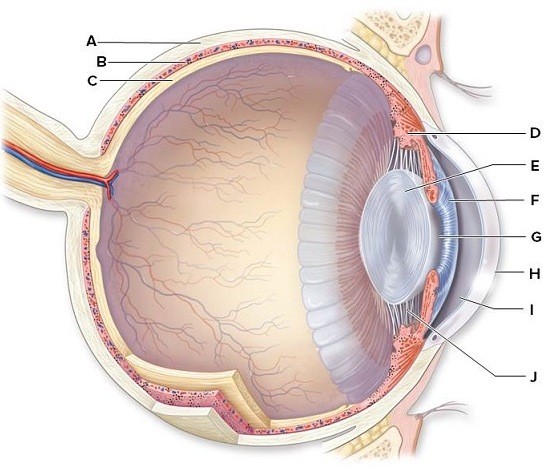Identify and briefly describe the function of the labeled structures in the human eye pictured here.  A:________B:________C:________D:________E:________F:________G:________H:________I:________J:________
A:________B:________C:________D:________E:________F:________G:________H:________I:________J:________
What will be an ideal response?
A: Sclera: protects and supports the eyeball
B: Choroid: absorbs stray light
C: Retina: contains sensory receptors for light
D: Ciliary body: holds the lens in place
E: Lens: refracts and focuses light rays
F: Iris: regulates light entrance
G: Pupil: admits light
H: Cornea: refracts light rays
I: Anterior compartment filled with aqueous humor: support eyeball, and nutrient and waste transport
J: Suspensory ligament: attaches the lens to the cilary body
You might also like to view...
The first organisms to adapt to life in intertidal zones were probably ____
a. plants b. cyanobacteria c. green algae d. fungi e. animals
What are somites?
a. neural tissue that gives rise to the cranial nerves b. neural tissue that give rise to the peripheral nerves c. neural tissue that gives rise to the two hemispheres of the brain d. mesoderm tissue that gives rise to the bones and skeletal muscles of the trunk e. mesoderm tissue that gives rise to the smooth muscles of the heart and lungs
Most flowering plants maximize their ability to take up nutrients by taking part in mutualisms with fungi. These
mutualisms are called ____.
a. root nodules b. Rhizobium c. mycorrhizae d. legumes e. endodermal associations
Gene testing allows the parents to learn more about their child in the prenatal period. However, there are genetic disorders, such as Huntington's disease, that show no phenotypic signs until age 35
This disease is caused by a dominant allele, resulting in degeneration of the brain, muscle spasms, and death within a decade or two. Because it is caused by a dominant allele, 50% of the offspring will carry the disease. If you knew that someone in your family had Huntington's disease, would you get tested early on, before you start a family and have your own children? Would you rather not know your fate, even if it means that you may pass the dominant allele of this disease to your offspring? (Note: Before being tested, a person usually undergoes a battery of psychological tests to make sure that he or she is emotionally stable enough to deal with knowing that he or she will develop the disease and that there is no cure.)